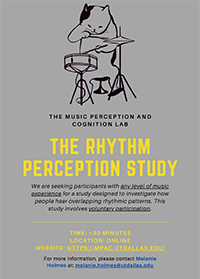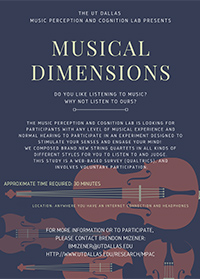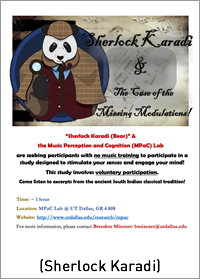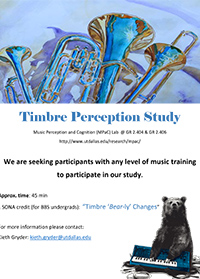Wrong Notes in Melodies
This is a cross-cultural study that investigates how Western and non-Western music teachers, students, and untrained but avid listeners identify wrong notes in culturally familiar and unfamiliar music. Participants will hear excerpts of popular Western and non-Western melodies and will identify the wrong notes embedded in them. The aim is to see what features of wrong notes lead them to be identified rapidly and accurately.
More details will be posted soon.
For more information, please email rachna.raman@utdallas.edu.
Study Personnel: Varun Athilat
Rhythm Perception
This study investigates how people tell the difference between rhythmic patterns coming in the two ears, even in the presence of noise. Participants will listen to a series of drumming patterns with headphones on. For each drumming pattern, participants will be asked whether the pattern they hear in their right ear is the same as or different from the pattern they hear in their left ear.
This study will be conducted online. More details will be posted soon.
For more information, please email melanie.holmes@utdallas.edu.
Study Personnel: Melanie Holmes
Cognitive Music Listening Space: A Multivariate Approach
This study investigates the differences in how French and American listeners describe Western music, and how music descriptors correspond to concrete musical qualities.
We are currently not recruiting participants for this study, but we plan on extending this to include Indian, Iranian, Nigerian, and Taiwanese listeners in the future. Stay tuned!
For more information, please email bmizener@utdallas.edu.
Study Personnel: Brendon Mizener
Carnātic Music and Parkinson’s Disease
This is a longitudinal study that investigates the effects of rhythm and melody on cognitive and motor abilities of participants with Parkinson’s disease. The study will provide evidence on whether brief exposure to solo rhythmic patterns played on Carnātic (South Indian classical) percussion instruments “thavil” and “mridangam,” as well as when combined with melodic patterns will facilitate performance on simple cognitive and motor tasks.
We are currently analyzing the data.
For more information, please email rachna.raman@utdallas.edu.
Study Personnel: Anuja Jayachandran, Anika Rao, Jacob Thomas
Music-Color-Emotion
This study investigates the association of melodies with color and emotion. Participants will listen to brief culturally familiar and unfamiliar melodies, and will associate colors and emotions based on musical features.
We are currently analyzing the data.
For more information, please email rachna.raman@utdallas.edu.
Collaborator(s): Alex Bichler, Chris Lo
Perception of Key Changes
This study examines how we perceive key changes—modulations—in Western and non-Western music. Participants will hear a series of brief excerpts of classical music that often contain changes of key. When they hear a change of key, they will press a button.
We are currently analyzing the data.
For more information, please email rachna.raman@utdallas.edu or bmizener@utdallas.edu.
Sorting Melodies
This is a cross-cultural study that investigates how Western and non-Western music teachers, students, and untrained but avid listeners sort culturally familiar and unfamiliar melodies into clusters based on underlying structural and emotional similarities. The purpose is to determine the criteria that listeners use to sort melodies. This study will provide converging evidence on how listeners use their mental representation of tonal hierarchies to understand the underlying structure of the melodies.
We are currently analyzing the data.
For more information, please email rachna.raman@utdallas.edu.
Study Personnel: Shreeya Prabu, Krishna Thirumalai
Collaborator(s): Michael Kriegsman, Shyam Murali
Timbre Perception
This study investigates how changing the instrument playing a melody influences recognition of said melody. In this experiment, participants are asked to listen to a series of unfamiliar melodies and rate whether they believe they have heard melodies previously in the study while ignoring features such as the instrument (timbre) and key.
We are currently analyzing the data.
For more information, please email kieth.gryder@utdallas.edu.
Study Personnel: Kieth Gryder





